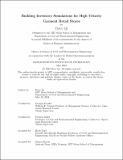| dc.contributor.advisor | Perakis, Georgia | |
| dc.contributor.advisor | Jaillet, Patrick | |
| dc.contributor.author | Qi, Davy | |
| dc.date.accessioned | 2024-08-12T14:15:51Z | |
| dc.date.available | 2024-08-12T14:15:51Z | |
| dc.date.issued | 2024-05 | |
| dc.date.submitted | 2024-06-25T18:17:34.835Z | |
| dc.identifier.uri | https://hdl.handle.net/1721.1/156020 | |
| dc.description.abstract | To facilitate agility in store inventory planning for a brick-and-mortar retail business with high sales velocity and product portfolio complexity, this project created a Monte Carlo tool that simulates how upstream shipment decisions impact capacity utilization and product complexity. The simulation model was built in two steps, first a Monte Carlo model for aggregated store inventory, followed by machine learning models that predict the display inventory and the number of store and display unique articles based on Monte Carlo outputs. In the process of building the Monte Carlo model, the project examined methods to model inventory trends, developed a quantification technique for daily demand stochasticity, and explored possibilities to control the simulation stochasticity. These methods and techniques, novel to retail inventory modeling, were able to model store inventory with little systematic biases and store daily mean absolute inventory deviations within 2-4%. Meanwhile for the machine learning models, the project systematically examined the efficacy of linear regression, tree and fully connected neural network models at making time series predictions using two time series as inputs. It also rigorously dives into the limitations and advantages of various
model architectures, including the selection of variables, treatment of multiple time series, order of predictions, and the scope of loss functions. The final machine learning model results showed some systematic biases with daily mean absolute deviation
ranging from 3-10% for display inventory and up to 10-20% for unique articles. | |
| dc.publisher | Massachusetts Institute of Technology | |
| dc.rights | In Copyright - Educational Use Permitted | |
| dc.rights | Copyright retained by author(s) | |
| dc.rights.uri | https://rightsstatements.org/page/InC-EDU/1.0/ | |
| dc.title | Building Inventory Simulations for High Velocity Garment Retail Stores | |
| dc.type | Thesis | |
| dc.description.degree | S.M. | |
| dc.description.degree | M.B.A. | |
| dc.contributor.department | Sloan School of Management | |
| dc.contributor.department | Massachusetts Institute of Technology. Department of Civil and Environmental Engineering | |
| mit.thesis.degree | Master | |
| thesis.degree.name | Master of Science in Civil and Environmental Engineering | |
| thesis.degree.name | Master of Business Administration | |
